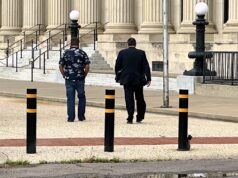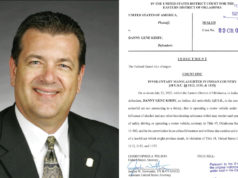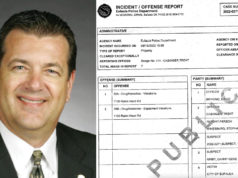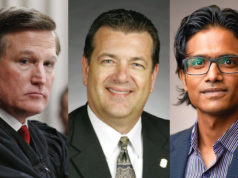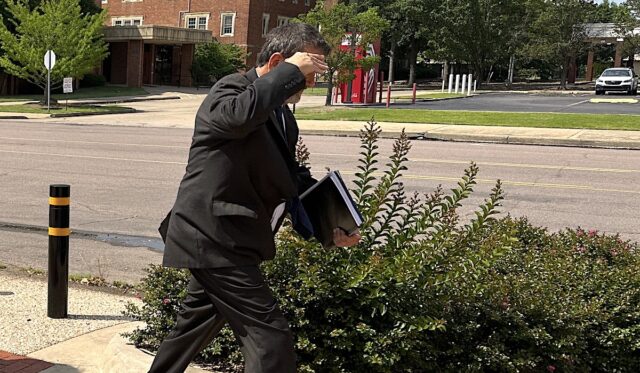

MUSKOGEE — Both the prosecution and defense wrapped up their cases this afternoon on the second day of the involuntary manslaughter trial for former Eufaula city councilman and former state Rep. Dan Kirby.
On Wednesday, both legal teams in the federal case are expected to make their closing arguments, and the jury will deliberate before delivering a verdict on whether Kirby is culpable in the death of his girlfriend, Sheryl Bichsel. On July 23, 2022, Kirby wrecked his motorcycle after a day of partying with friends, and Bichsel was thrown from the vehicle while not wearing a helmet.
Because Kirby is a citizen of the Muscogee (Creek) Nation, he is being tried in U.S. District Court for the Eastern District of Oklahoma. Bichsel was a citizen of the Choctaw Nation. The wreck happened within the Muscogee Reservation near Checotah.
After hearing testimony from three of the government’s witnesses Monday, jurors heard testimony from prosecutors’ final three witnesses Tuesday morning: Oklahoma Highway Patrol Trooper Sheldon Dobbs (who investigated the wreck), Rory Deol (who examined Bichsel’s body after her death), and Jarrad Wagner, a forensic toxicologist who issued two reports on the contents of Kirby’s blood the night of the crash.
On Tuesday afternoon, jurors heard from two witnesses called by Kirby’s lawyer, John Campbell: Fred Smith and Steven Hunt, both of whom saw the wreck take place.
‘More impairing than you would expect’

Tuesday morning, prosecutors continued to make their case that Kirby’s alleged intoxication caused the crash that killed Bichsel.
While Kirby’s blood alcohol content was 0.028 that night, below the legal limit of 0.08, the OSBI toxicology analysis also found a combination of other chemicals in his system, including unspecified amounts of amphetamine, marijuana, tramadol, oxycodone and a pair of anti-depressants — citalopram and trazodone.
Wagner testified that a person does not have to have a BAC of 0.08 to be impaired.
“You can have someone seem intoxicated at a much lower level. (…) It just sort of depends on the person,” Wagner said. “(In) my expert opinion, there can be impairment below .08.”
In his cross examination of Wagner, Campbell emphasized the lack of specified amounts of the drugs in Kirby’s system, saying they could simply have been “trace” amounts remaining from prior use.
Wagner, however, said knowing the amounts of the various drugs in Kirby’s blood was not necessary to determine intoxication.
“Knowing the amount of drug present wouldn’t have helped me,” Wagner said.
While Wagner said he did not know what amount of those substances was necessary to cause them to show up in an OSBI blood toxicology report, he said the mixture of chemicals — combined with alcohol — would indicate Kirby’s impairment.

“The two substances combined are more impairing than you would expect,” Wagner said of alcohol and marijuana, before discussing the narcotics. “The opioids and alcohol are not supposed to be taken together, and you are more likely to be in a crash with them combined than if they were taken separately.”
Wagner also used dash cam footage from the night of the incident to inform his analysis of Kirby’s impairment. He said Kirby swayed in the video and showed an inability to follow OHP trooper Charles Epley’s instructions during the field sobriety test. Combined with the substances in Kirby’s blood, Wagner said that was enough to conclude Kirby’s intoxication contributed to the wreck.
“Video evidence along with the toxicological evidence (…) says he was impaired after the crash,” Wagner said.
But Campbell pushed back on Wagner’s analysis of the video. Jurors were shown multiple angles of the field sobriety test Monday, and Campbell attempted to poke holes in the assertion that Kirby was swaying.
Campbell also attempted to give Kirby an excuse for not complying with the Horizontal Gaze Nystagmus test Monday, arguing that the sight of Bichsel being loaded into an ambulance within Kirby’s line of sight during the test would have understandably distracted him.
Tuesday morning, Campbell succeeded in getting Wagner to admit that the blood toxicology report alone would not have been enough for him to conclude that Kirby was intoxicated.
Campbell: Trooper testimony ‘highly suspect’
Another argument that Campbell again emphasized after bringing it up Monday involved the fact that Kirby was not arrested the night of the crash. While he was handcuffed at one point, Kirby was released after being transported to a Muskogee hospital to have his blood drawn.
In his cross examination of Dobbs, the trooper who investigated the crash, Campbell asked why Kirby was not arrested that night.
Dobbs said cases are different when one of the parties is a tribal citizen because the district attorney is not involved, and he said the fact that Bichsel did not die that night complicated the issue.
But Campbell succeeded in getting Dobbs to admit that charging decisions are “none of your business” regardless of the citizenship of the parties involved.
“Your job is just to keep the peace,” Campbell said.
Campbell, who pursued the same line of questioning with Epley, implied that if the officers thought Kirby was actually intoxicated, they would have been endangering Kirby and others by letting him go that night.
After the government rested its case, Campbell called Epley’s testimony “highly suspect” when he made a Rule 29 motion, essentially asking the judge to acquit Kirby without the jury rendering a verdict.
District Court Judge John F. Heil III denied Campbell’s motion, saying in part that evaluating credibility of witnesses is a job for the jury.
In addition to casting doubt on Kirby’s intoxication, Campbell also attempted to show that Bichsel’s lack of a helmet contributed to her death.
Rory Deol, a forensic pathologist in the Office of the Chief Medical Examiner of Oklahoma who examined Bichsel’s body, said her death was caused by multiple blunt force injuries.
In response to Campbell’s questioning, he said Bichsel’s skull showed multiple injuries.
When Campbell asked if a helmet would have provided protection from those injuries, Deol said “possibly.”
Two friends say Dan Kirby ‘was fine’
Tuesday afternoon, Campbell called two witnesses to Kirby’s defense: Fred Smith and Steven Hunt, who were both driving motorcycles behind Kirby and saw the wreck. While the prosecution emphasized that both Smith and Hunt made the same turn that Kirby did with no issues, Campbell drew the jury’s attention to outside factors that could have caused the crash.
Throughout the trial, Campbell has emphasized the darkness of the night and the road’s lack of markings to show that it was difficult to navigate. During Smith’s testimony, Campbell asked about Kirby’s spot at the front of the line of three motorcycles.
Smith, who has been driving motorcycles “since I was about 10 years old,” said that, in his experience, driving at the front of a line of motorcycles at night is difficult owing to the shifting shadows that other headlights create.
When asked about the bright LED headlight of the motorcycle behind Kirby, Smith said, “I don’t think it assisted him at all.”
Campbell also emphasized the two men’s observations of Kirby before they started driving. Both Smith and Hunt said they would not have let Kirby drive if they thought he had been intoxicated.
“He was normal. He wasn’t stumbling or anything like that,” Smith said. “I don’t think he would have got on his bike if he was.”
Hunt echoed Smith’s assessment.
“I’ve known Dan for a while,” Hunt said. “I know how he moves and walks and talks, and he was fine.”
DAY ONE:
Dan Kirby trial begins with emotional testimony, questions over impairment by Bennett Brinkman
Prosecutors Jordan Howanitz and Josh Satter attempted to poke holes in the credibility of each witness in their cross examinations, emphasizing their inability to remember events. The prosecutors asked both Smith and Hunt a variety of questions about the day’s events, including how much alcohol and marijuana Kirby had consumed. Both men repeatedly said they could not remember various details.
Hunt was asked about an event earlier in the evening when the group had to push-start a second motorcycle. On Monday, Janann Geis — Hunt’s girlfriend who also witnessed the wreck — testified that Kirby fell over and sustained lacerations while the group was pushing the vehicle.
As Campbell asked Hunt about that incident, Hunt began to cry and his voice cracked.
“This is stuff I’m going to live with for the rest of my life,” Hunt said. “When a motorcycle doesn’t start, that’s a good sign you shouldn’t ride it.”
Both legal teams are set to make their closing statements Wednesday morning, after which the jury will go into deliberations until they return a verdict. Involuntary manslaughter convictions carry a maximum sentence of eight years in prison.










